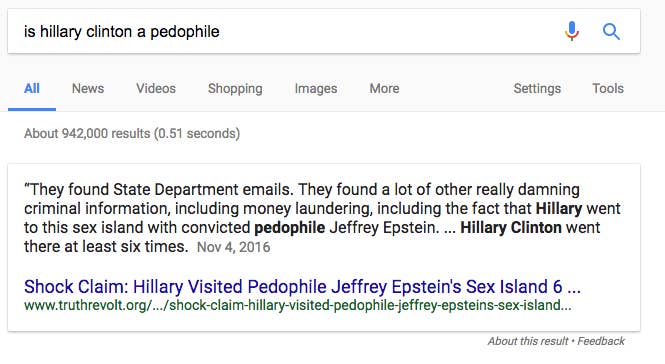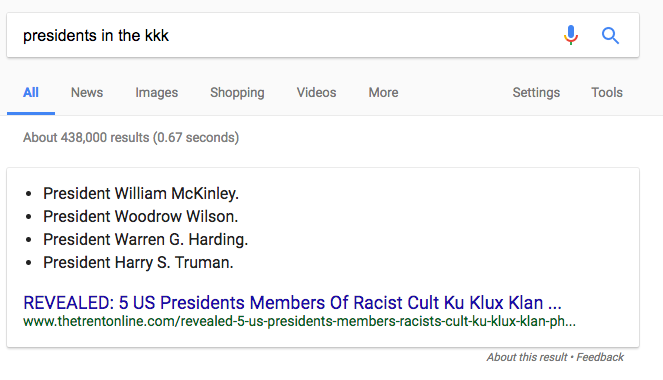Google keeps highlighting false and conspiratorial information in its search results.

First pointed out by Danny Sullivan, editor-in-chief of the blog SearchEngineLand, the issue concerns featured snippets — which is the text from top search results that Google's algorithm sometimes displays when you look something up. Sometimes Google's featured snippets show conspiratorial and outright false results from hyperpartisan news sources. MozCast, which monitors Google's search algorithm, says that 20% of searches may return a featured snippet.
If you ask Google Home a question, sometimes it responds by summarizing a featured snippet, which can be a fabrication.
One more. As best I can tell, no US presidents were in the KKK yet Google lists five of them.
If you search for "presidents in the KKK," Google shows a featured snippet listing the names of five presidents, none of whom were actually in the KKK. Google is pulling the result from thetrentonline.com, a digital publication that bills itself as "Nigeria's premier online newspaper." No presidents were confirmed members of the KKK, though Harding and Truman faced allegations of membership. As of March 7, 2017, Google is still showing this as the top result for the search query.

And the problem bridges political ideologies:
Google Home: "Yes, republicans = nazis"
It's not the first time this has happened, Sullivan points out. In 2015, Google highlighted a religious answer explaining what happened to dinosaurs, and in 2014 the first result for "king of the united states" was "Barack Obama."
Google does not present the snippets as facts or news, instead describing them by saying, "When we recognize that a query asks a question, we programmatically detect pages that answer the user's question, and display a top result as a featured snippet in the search results. Like all search results, featured snippets reflect the views or opinion of the site from which we extract the snippet, not that of Google." But because Google highlights and promotes these results, it can give users a cursory impression that Google may be promoting the material because it directly and correctly answers the searcher's question.
After fake news on Facebook played a starring role in the 2016 election, Google has taken a hard stance against fake news sites in its online ad networks, banning hundred of publishers in Q4 2016. Facebook and Twitter, by contrast, have taken a more hands-off approach as they struggle to remain committed to the idea of unfettered free speech while also facing criticism for being platforms on which misinformation spreads. Making things worse is the fact that most Americans believe fake news when they see it.
If you're getting bad search results in the featured snippets box, you can opt out of having them displayed, though you'll need to understand HTML webpage code to do it.
Google said in a statement, "Featured Snippets in Search provide an automatic and algorithmic match to a given search query, and the content comes from third-party sites. Unfortunately, there are instances when we feature a site with inappropriate or misleading content. When we are alerted to a Featured Snippet that violates our policies, we work quickly to remove them, which we have done in this instance. We apologize for any offense this may have caused."
